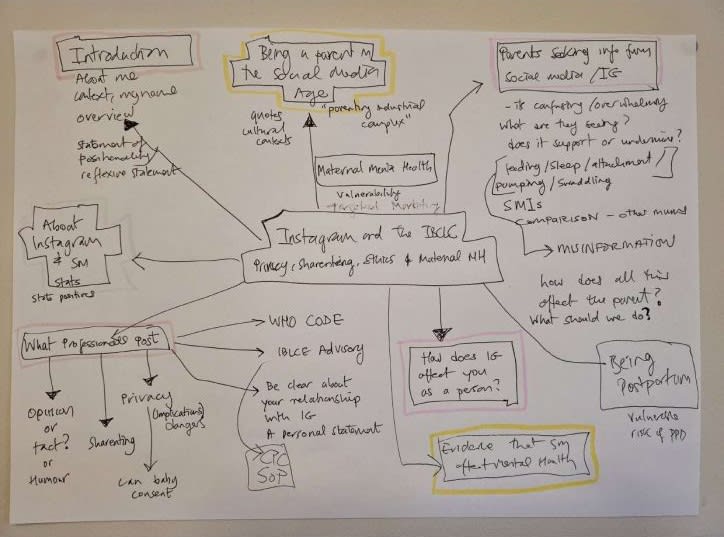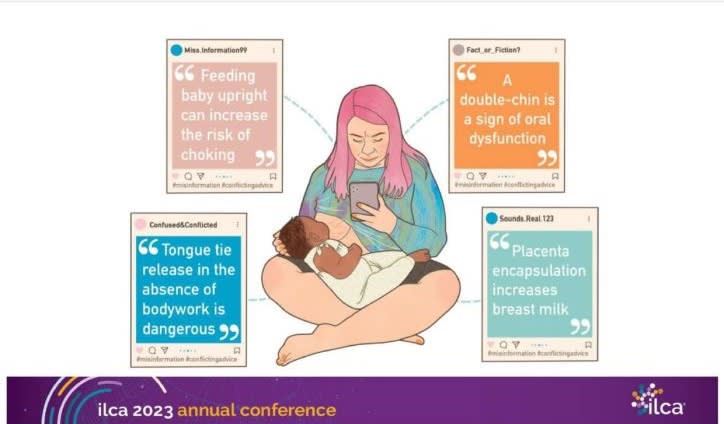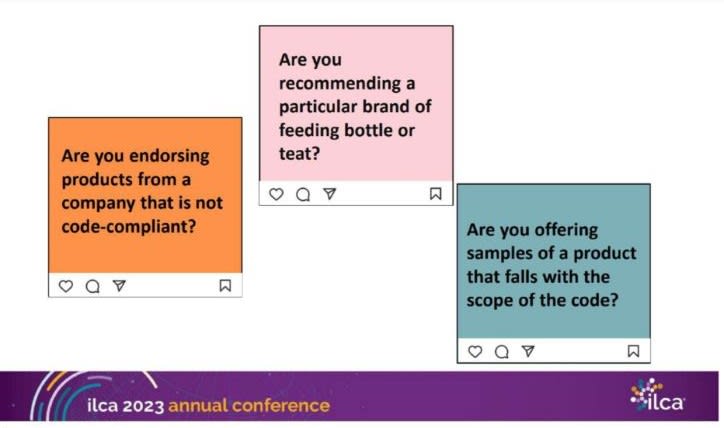ILCA Conference 2023

Have you ever wondered how people end up presenting at large or international conferences such as the ILCA Conference? Well wonder no more because in this article I’m going to explain how it all works and what my own experience of speaking at the ILCA conference was like.
Over the last year or two I have become much more aware of comments from new mothers about information on infant feeding, parenting, infant sleep and newborn behaviour that they are seeing on Instagram. Some of the information comes from trusted sources and is sound and evidence-based based. However, much of it is not helpful, not evidence-based and in fact could be classed as misinformation and/or predatory marketing. The problem with this misinformation and predatory marketing is that it has the potential to negatively impact on a woman’s experience of becoming a mother and her self-confidence, and can lower her sense of breastfeeding self-efficacy. In my private practice work, I have certainly noticed higher levels of anxiety among client in recent years, and often when we explore the causes, we can trace it back to Instagram or other social media platforms. I started to take a closer look at the kind of content on Instagram that my clients and other mothers and parents were potentially being exposed to. As I did so, an idea started to take shape in my head of a presentation that would analyse this content in detail, and consider its’ impact on new parents. I also started to consider the content that IBCLCs and lactation professionals were posting on Instagram and the things that we need to be mindful of, such as the IBCLC Commission Code of Professional Conduct, Scope of Practice and the World Health Organisation Code on the Marketing of Breastmilk Substitutes. All the while I was contemplating my own thoughts and feelings about Instagram and social media. So, with a head full of ideas for a presentation around the topic of Instagram use by new parents and IBCLCs, I started to draw a big mind map on a blank A3 sheet of paper (see fig 1 below).

I always find mind-mapping to be a really helpful way to untangle my thoughts and get some clarity, or shape, to a particular idea that’s swirling round my head. Once I did the mind map for this topic, I felt confident that I had the bare bones of an interesting (at least to me!) conference presentation. It would be a presentation of two halves; the first looking at the kind of misinformation, predatory marketing and momfluencer content that new parents are seeing on Instagram, and the second half would explore ethical, legal and privacy-related concerns for IBCLC when posting on Instagram.
Around the time that I was mind mapping this topic, I happened to notice a call for abstracts for the ILCA 2023 Conference in Las Vegas. I already had given some thought to attending the conference in person, so I decided I may as well send in an abstract. I did it all through the ILCA website online application process whereby you provide information about yourself, a presentation abstract, key learning objectives of the presentation and at least five recent citations to support your application. I know that not everyone may be familiar with the concept of writing an abstract, but basically it is a paragraph of around 200 words that outlines the main ideas that you are going to explore in your presentation and a rationale for why this topic is important. It should be clear and concise and pique the interest of the reader.
This is the abstract I included in my application:
Instagram and the IBCLC – Ethics, Privacy, Misinformation and Maternal Mental Health
Parents are increasingly turning to Instagram for information on aspects of parenting such as feeding, sleeping and baby behaviour. Globally, the use of Instagram has more than doubled in the past five years, with the platform on track to reach 2.5 billion users by the third quarter of 2023. The kind of content that parents may see on the platform includes posts from commercial entities, influencers who are gifted products or paid to promote products, other parents, and professionals (including IBCLCs) who work with parents antenatally and postpartum and who ‘share’ information pertaining to their area of expertise. There are many positives for both parents and professionals in using Instagram, however, the platform also presents a number of ethical issues relating to the type of information that is shared, privacy issues and the practice of ‘sharenting’, ie the documenting of children’s lives on Instagram. Additionally, a small number of recent studies have explored how Instagram can affect mother’s mental health, body image and degree of perceived self-efficacy.
This presentation will explore issues around Instagram use for IBCLCs, in particular, ethical concerns related to the type of content they share, consent, the law and sharenting. These issues will be considered in the context of the IBLCE’s Code of Professional Conduct and the World Health Organisation code on the marketing of breastmilk substitutes. The presentation will also look at the type of information new parents are being exposed to on Instagram, and how this information might be shaping their views on aspects of parenting such as breastfeeding, pumping, newborn behaviour, safe sleep practices and tongue tie. Another aspect of Instagram use by new parents that will be considered is how it can affect mental health and parents’ perceived self-efficacy.
I submitted the application around the beginning of February (the closing date for applications was 15th February) and received confirmation around two months later on 5th April that my abstract had been accepted for an online presentation at the conference. I was thrilled to have been accepted but also a bit daunted as it meant I actually had to get cracking and start putting the presentation together. I had until the beginning of July to submit a competed PowerPoint presentation for review by ILCA.
The first thing I did was start reading books and research papers and anything else I could find on topics which I felt were relevant to my presentation, such as the phenomenon that is Instagram, motherhood in the social media age, maternal mental health, privacy, sharenting and predatory marketing. In the space of a month I read around 8 books (see image here fig2 ) and did some fairly in-depth research of parent-facing content on Instagram and of recent studies on motherhood, breastfeeding and social media. I’ve included the references from my presentation at the bottom of this article, just to give you an idea of how much reading and research I did. I suppose I felt that because it was an international conference I had to do everything I could to knock it out of the park. Or at least try! To keep track of all that I was reading and useful nuggets of information or quotes I came across, I created a table in a Word document with three columns: ‘Theme’, ‘Quote’ and ‘Source’ – that way I had everything in one place and could use the document as a basis for my PowerPoint presentation.

Fig 2 above
I spend a solid two months putting the 87-slide PowerPoint presentation together. I was very determined that it would look attractive and be engaging, because one of my pet peeves is poor quality PowerPoint slides eg. things like font that is too small to read, too much text, and boring or visually unappealing content. I commissioned artist Lauren Rebbeck (who created images to represent the research I did on women’s experiences of breastfeeding with Primary Low Milk Supply) to create some images for me ( see image fig 3 and fig 4).

fig 3 above

fig 4 above
I did a practice run of the presentation – a sort of a first draft - in mid-May to a few volunteers (thank you Mairead Murphy, Maria O’Sullivan, Ciara Butler and Heidi Hembry) who gave me some very useful feedback and lots of encouragement. And after that I kept working on it, and refining it until I had to submit it in July. Once ILCA had accepted my final PowerPoint draft, I recorded the presentation on Zoom and sent it to the conference organisers. I did not particularly enjoy recording the presentation on Zoom – I wasn’t in my comfort zone. But, shortly after I did the recording, ILCA got in touch to offer me the opportunity to present live in Las Vegas instead (apparently someone else had had to cancel). I immediately said yes, as by this stage I had already made plans to attend the conference in person.
I have to admit, I did experience quite a bit of anxiety and imposter syndrome in the run up to the trip to Las Vegas. Would I be good enough? Who do I think I am thinking I can present at an international conference? Will anyone even want to hear what I have to say? I just kept working on silencing that inner anxiety, and reminding myself that my voice and my insights were as valid as anyone else’s.
On the day, it was grand. I had done the work and done as much as I possibly could have to prepare, so I knew what I was talking about, and that gave me confidence. I also had my fanclub of one, Lorraine O’Hagan, in the audience waving her Irish flag! I only said sh*t once (when my mic fell off) and there were loads of questions from attendees at the end, which I took to be a good sign. I’m glad I did it. It was a big thing for me and I definitely feel more confident about doing future presentations, and also just more confident in myself – it’s that thing of setting yourself a challenge and having the determination and bloody-mindedness to follow it through, despite the moments when you feel afraid and anxious.
Just a couple of things to note about speaking at ILCA:
ILCA does not pay its’ speakers (whether they speak online or in-person), and neither does it pay expenses to speakers. However, ILCA does offer speakers a 25% discount on the conference fee. Given that the in-person conference fee is $850, it is still a very expensive conference to attend, even with a 25% discount. In my case, I had decided to travel to the conference irrespective of whether I would be getting any remuneration or expenses for my talk. I am aware of the privilege of being able to afford to attend the conference. Delivering the presentation online is an affordable option for speakers, but the fact remains that you are not paid anything for your time.
I found the ILCA staff very good to deal – always professional, pleasant and clear in their communications to me. The process for submitting an abstract and subsequently being accepted to present is a very streamlined and systematic one. The key dates are given to you at the outset, such as when you need to submit your learning objectives or your PowerPoint slides, so that helps with planning.
Do you have a presentation in you? Could you present at the ALCI Conference? ILCA? iLactation? Gold Lactation? LCGB? ELACTA? If you have an idea that you think could be developed into a conference presentation, start writing things down or mind mapping. And see where that takes you. Everyone has some unique experience, knowledge or perspective to offer.
If you would like some guidance on writing a conference abstract, please feel free to email me at [email protected].
References:
Agarwal, P., 2021. (M)otherhood On the choices of being a woman. Cannongate Books.
Aston, M., Price, S., Hunter, A., Sim, M., Etowa, J., Monaghan, J. & Paynter, M. 2021, "Second Opinions: Negotiating Agency in Online Mothering Forums", Canadian journal of nursing research, vol. 53, no. 4, pp. 327-339.
Auxier, B., Anderson, M., Perrin, A. and Turner, E., 2020. Parents’ attitudes–and experiences–related to digital technology.
Azad, MB, Nickel, NC, Bode, L, et al. Breastfeeding and the origins of health: Interdisciplinary perspectives and priorities. Matern Child Nutr. 2021; 17:e13109. https://doi.org/10.1111/mcn.13109
Baker, B. & Yang, I. 2018, "Social media as social support in pregnancy and the postpartum", Sexual & reproductive healthcare, vol. 17, pp. 31-34.
Black, R., McLaughlin, M., & Giles, M. (2020). Women's experience of social media breastfeeding support and its impact on extended breastfeeding success: A social cognitive perspective. British Journal of Health Psychology, 25(3), 754-771. https://doi.org/10.1111/bjhp.12451)
Braghieri, L., Levy, R. & Makarin, A. 2022, "Social Media and Mental Health", The American economic review, vol. 112, no. 11, pp. 3660-3693.
Brooks, E.C., 2013. Legal and ethical issues for the IBCLC. Jones & Bartlett Publishers.
Bryson, H., Perlen, S., Price, A., Mensah, F., Gold, L., Dakin, P. & Goldfeld, S. 2021, "Patterns of maternal depression, anxiety, and stress symptoms from pregnancy to 5 years postpartum in an Australian cohort experiencing adversity", Archives of women's mental health, vol. 24, no. 6, pp. 987-997.
Burke-Garcia, A., Kreps, G.L. & Wright, K.B. 2018, "Perceptions about disseminating health information among mommy bloggers: Quantitative study", JMIR research protocols, vol. 20, no. 4, pp. e116-e116.
Chin, S., Carlin, R., Mathews, A. & Moon, R. 2021, "Infant safe sleep practices as portrayed on instagram: Observational study", JMIR pediatrics and parenting, vol. 4, no. 4, pp. e27297-e27297.
Coyne, S.M., McDaniel, B.T. & Stockdale, L.A. 2017, "“Do you dare to compare?” Associations between maternal social comparisons on social networking sites and parenting, mental health, and romantic relationship outcomes", Computers in human behavior, vol. 70, pp. 335-340.
Esfandiari, M. & Yao, J. 2022, "Sharenting as a double-edged sword: evidence from Iran", Information, communication & society, vol. ahead-of-print, no. ahead-of-print, pp. 1-19.
Franco-Lares, B., Lara-Mejía, V., Lozada-Tequeanes, A.L., Villanueva-Vázquez, C. and Hernandez-Cordero, S., 2023. Legislation on marketing of breast-milk substitutes in digital and social media: a scoping review. BMJ Global Health, 8(3), p.e011150.
Friedman M. (2018). Insta-judgement: Irony, authenticity and life writing in mothers’ use of Instagram. Interactions: Studies in Communication & Culture, 9(2), 169–181.
Frier, S. 2020. No Filter: How Instagram transformed business, celebrity and culture. Penguin Random House, UK.
Germic, E. R., Eckert, S. and Vultee, F. (2021) 'The Impact of Instagram Mommy Blogger Content on the Perceived Self-Efficacy of Mothers', Social media + society, 7(3), pp. 205630512110416.
Gingnell, M., Bannbers, E., Moes, H., Engman, J., Sylvén, S., Skalkidou, A., Kask, K., Wikström, J. & Sundström-Poromaa, I. 2015, "Emotion reactivity is increased 4-6 weeks postpartum in healthy women: A longitudinal fMRI study", PloS one, vol. 10, no. 6, pp. e0128964-e0128964.
Grond, S.E., Kallies, G. and McCormick, M.E., 2021. Parental and provider perspectives on social media about ankyloglossia. International Journal of Pediatric Otorhinolaryngology, 146, p.110741.
Haley, C.O., Gross, T.T., Story, C.R., McElderry, C.G. and Stone, K.W., Social Media Usage as a Form of Breastfeeding Support Among Black Mothers: A Scoping Review of the Literature. Journal of midwifery & women's health.
Haugen, F. 2023. The Power of One: Blowing the Whistle on Facebook. Little, Brown and Company.
Hennessy, M. et al. (2020) '“They Just Need to Come Down a Little Bit to your Level”: A Qualitative Study of Parents’ Views and Experiences of Early Life Interventions to Promote Healthy Growth and Associated Behaviours', International journal of environmental research and public health, 17(10), pp. 3605.
IBLCE (2022). Advisory Opinion on Professionalism in the Social Media Age. Available at https://iblce.org/wp-content/uploads/2022/08/2022_August_17_Updated_Advisory-Opinion-Social-Media-Professionalism-and-Online-Communities.pdf [Accessed 29 April 2023].
Keats Citron, D., 2022. The Fight for Privacy: protecting dignity, identity, and love in the digital age. Penguin Random House.
Kirkpatrick, C.E. & Lee, S. 2022, "Comparisons to picture-perfect motherhood: How Instagram's idealized portrayals of motherhood affect new mothers' well-being", Computers in human behavior, vol. 137.
Levy, M., 2023. Don’t Forget to Scream: unspoken truths about motherhood. Phoenix Books.
Marcon, A.R., Bieber, M. & Azad, M.B. 2019, "Protecting, promoting, and supporting breastfeeding on Instagram", Maternal and child nutrition, vol. 15, no. 1, pp. e12658-n/a.
Moujaes, M. and Verrier, D. (2021) 'Instagram use, InstaMums, and anxiety in mothers of young children', Journal of media psychology, 33(2), pp. 72-81.
NBC News (2023). How one teen is urging legislators in Washington state to help protect kids from being exploited on vlogs. Available at: How one teen is urging legislators in Washington state to help protect kids from being exploited on vlogs (nbcnews.com). (Accessed 15 May 2023)
Plunkett, L., 2019. Sharenthood: Why we should think before we talk about our kids online (strong ideas). The MIT Press.
Politico (2023). France aims to protect kids from parents oversharing pics online. Available at France aims to protect kids from parents oversharing pics online – POLITICO. (Accessed 15 May 2023).
The Privacy Whisperer (2022) ‘Your Child’s Privacy is Worth More than Likes’ Available at https://www.theprivacywhisperer.com/p/your-childs-privacy-is-worth-more. [Accessed 14 April 2023]
Richards, N., 2022. Why Privacy Matters. Oxford University Press.
Seals-Allers, K., 2017. The Big Letdown: How Medicine, Big Business, and Feminism Undermine Breastfeeding. St. Martin’s Press.
Skelton, K.R., Evans, R., LaChenaye, J., Amsbary, J., Wingate, M. and Talbott, L., 2018. Exploring social media group use among breastfeeding mothers: Qualitative analysis. JMIR pediatrics and parenting, 1(2), p.e11344.
Stickel, S., Eickhoff, S.B., Habel, U., Stickeler, E., Goecke, T.W., Lang, J. & Chechko, N. 2021, "Endocrine stress response in pregnancy and 12 weeks postpartum – Exploring risk factors for postpartum depression", Psychoneuroendocrinology, vol. 125, pp. 105122-105122.
Yeung, A., Ng, E. and Abi-Jaoude, E., 2022. TikTok and attention-deficit/hyperactivity disorder: a cross-sectional study of social media content quality. The Canadian Journal of Psychiatry, 67(12), pp.899-906.
Zappas, M.P., Becker, K. & Walton-Moss, B. 2021, "Postpartum Anxiety", Journal for nurse practitioners, vol. 17, no. 1, pp. 60-64.
World Vision Cambodia, 2022, “Under [social media] influence digital marketing of breastmilk substitutes in Cambodia”
Complied by: Caoimhe Whelan
Dated: 1st September, 2023.
Caoimhe did not receive a bursary from ALCI for this report.
ALCI Council would like to thank you for this report.
************************